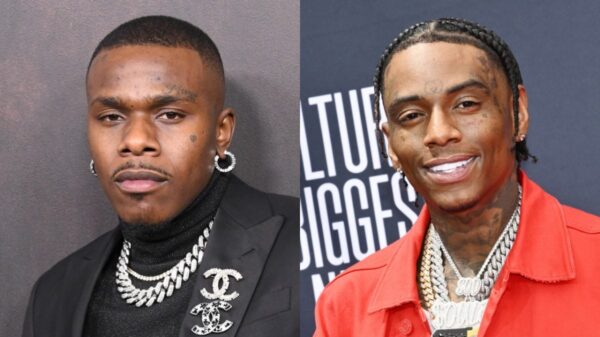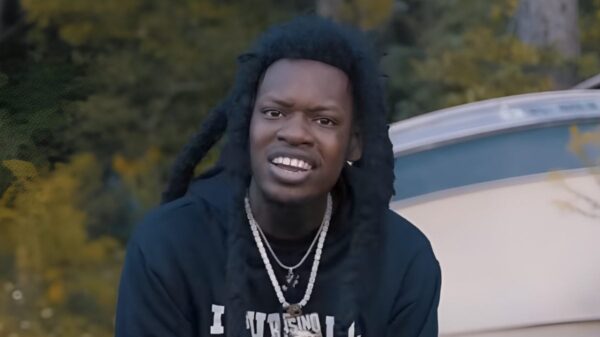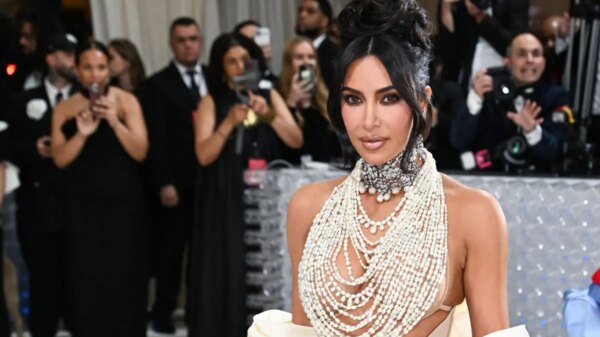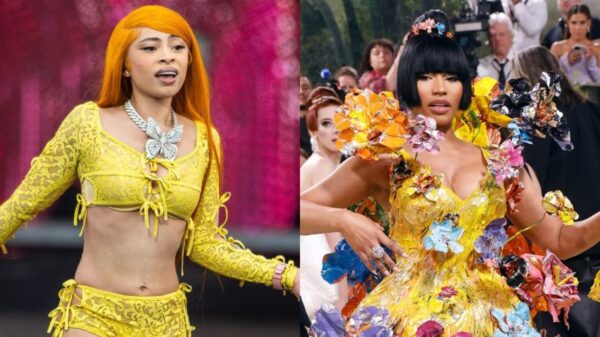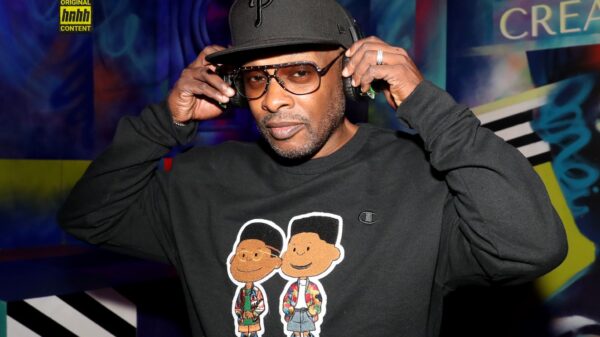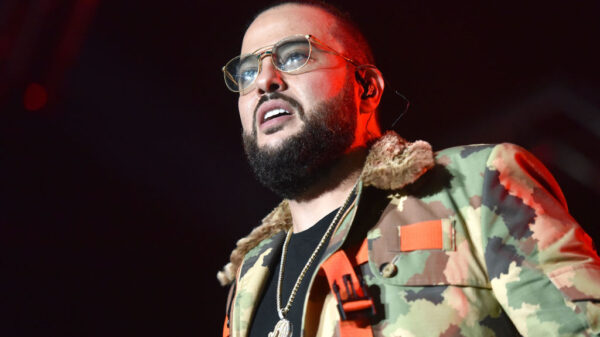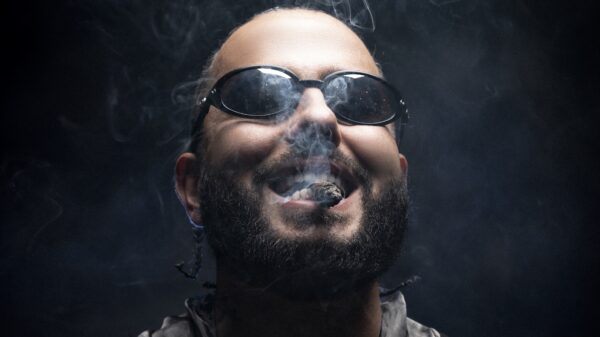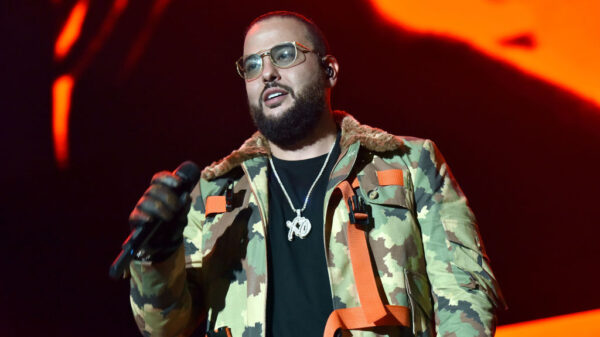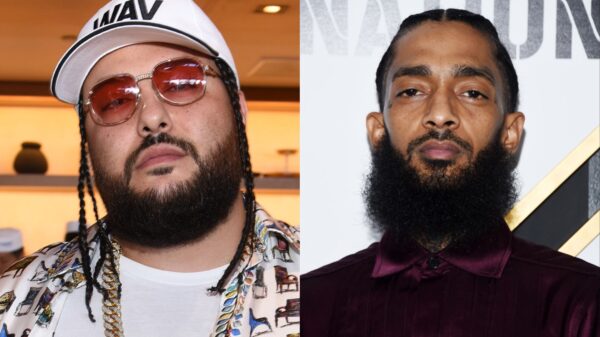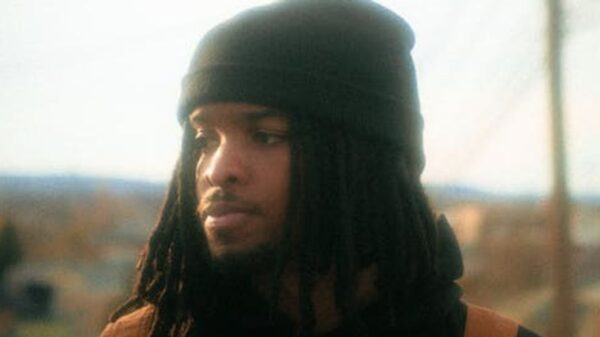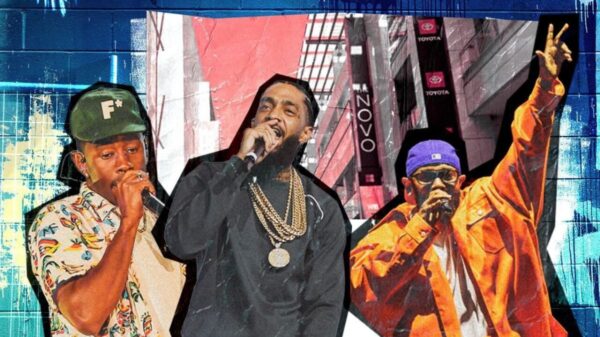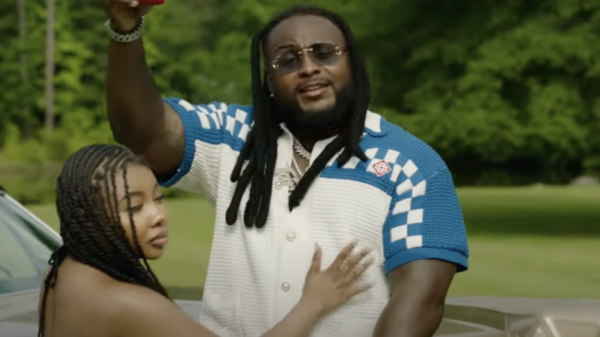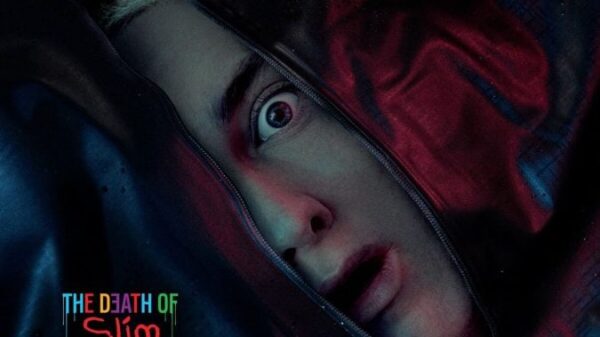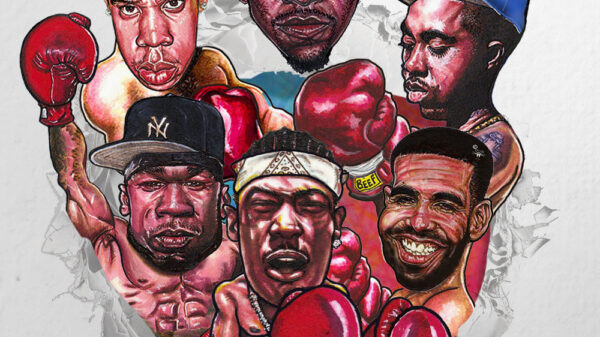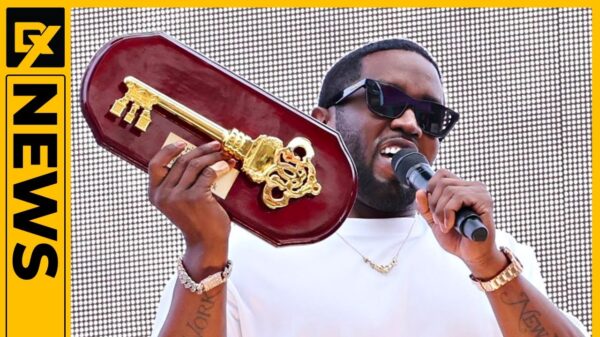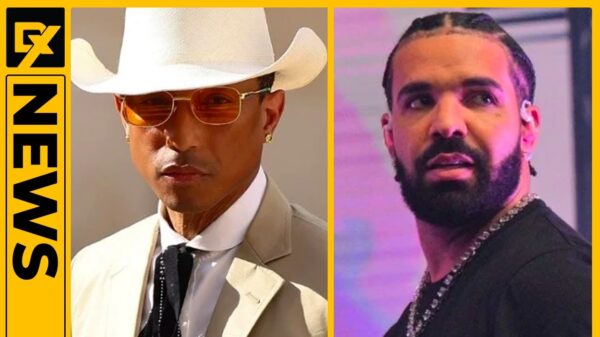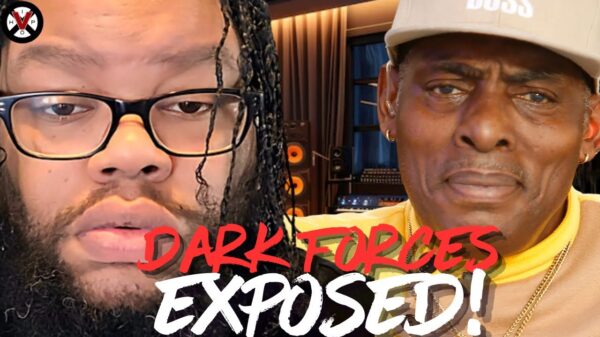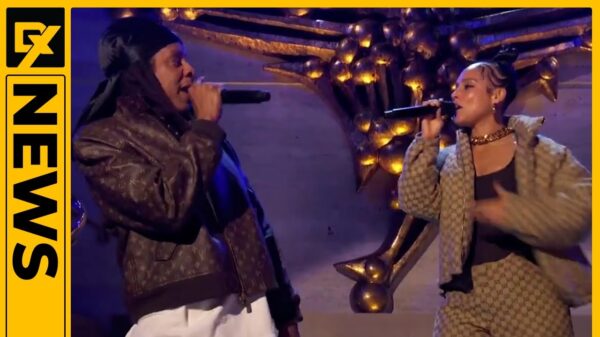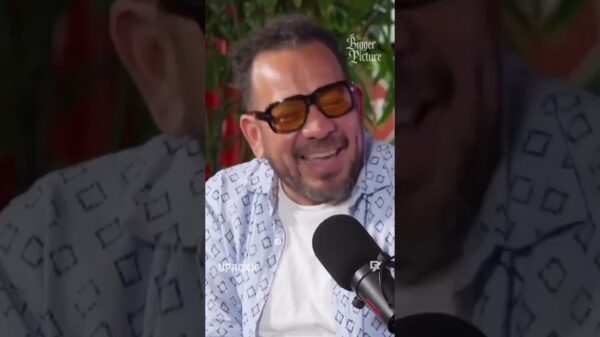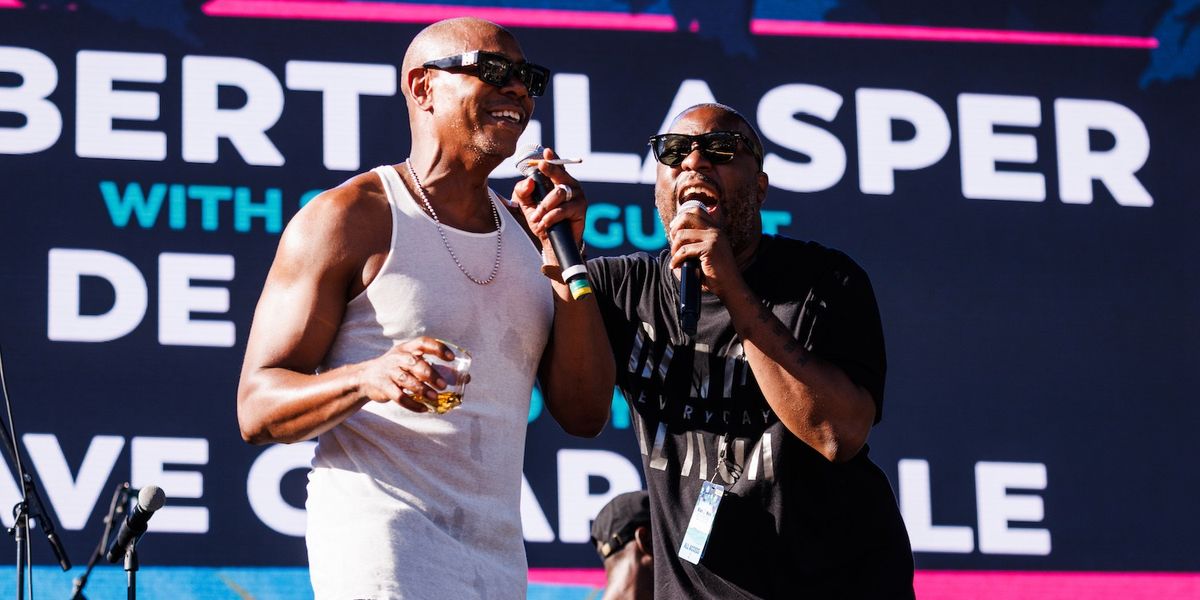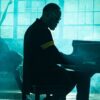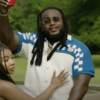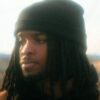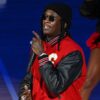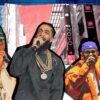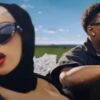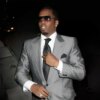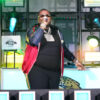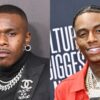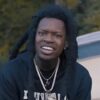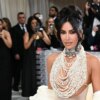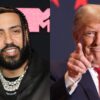Dave Chappelleand Robert Glasper’s The Blue Note Jazz Festival is about something much bigger than its conceit. The festival, now in its second year, is generating a blueprint for collective attunement and providing an intentional space of beauty, joy, and camaraderie. It’s a place where Black and African diasporic cultural traditions can be transmitted and transformed. As we celebrate the 50th anniversary of hip-hop this month, we turn to epic intergenerational hangs like this one — which went down at the Silverado Resort in Napa Valley, California last weekend — to take an honest pulse of the culture.
From witnessing Bilal scatting with Lalah Hathaway and Philip Bailey to the continuum of the McFerrin family (Bobby, Taylor and Madison) improvising on stage to Rakim freestyling in the same extemporaneous cipher as Talib Kweli and Chance the Rapper, this year’s festival felt like a rip in the fabric of spacetime opened up just to receive the boundless divine sounds bursting forth from Napa Valley.
We had the privilege of breaking bread with a few of the torchbearers of Black music and culture — from comedy to folkloric African diasporic tradition — to talk about a wide spectrum of topics, from the fraught history of jazz as a category to the responsibility of the artist to reflect the times, to what the next 50 years of hip-hop will bring. Through connecting with this continuum of living legends, we have the unique opportunity to learn from, metabolize and integrate the hard-earned wisdom of Digable Planets, Robert Glasper, Nicholas Payton, Meshell Ndegeocello, Weedie Braimah, Affion Crockett, and Amir Sulaiman.
Each of the following conversations were recorded separately with each artist and composed in the edit as a collective conversation for stylistic purposes.
What’s your relationship to the category of jazz and to the act of labeling your art period?
Robert Glasper.Photo by Ashleigh Reddy for Okayplayer.
Nicholas Payton (trumpeter): Well, I think you already know that I’m not a fan of the word. I find it to be oppressive. I think it’s the musical equivalent of the N-word. To me, it puts you in a box. It means less album sales, it means less ticket sales. It means if you’re a jazz artist and you win Artist of the Year at the Grammys, you don’t get to play with your own band. Black music is the foundation of American popular music, period. Louis Armstrong was the world’s first pop star. So the fact that you want to call this music “jazz” and sort of sit in the corner as this underground sort of thing where it’s glorified to not make as much money or to be as celebrated, it’s ghettoism. And I didn’t get into this business to be second best or to be put in a corner.
Meshell Ndegeocello (musician): I’m a student of Black American music… So I believe it is something unique to growing up here and having a certain experience as a person of color, as people who were enslaved. I think there’s a beauty and a depth to all music that comes from that diaspora. And I don’t need a label because I play music for people who are seeking well-being or seeking a way to be more thoughtful, something to soothe their mind or lift their spirits.
Robert Glasper (musician and co-founder of the Blue Note Napa Valley Jazz Festival): Yeah, I mean, it’s an uphill battle. I just want to make good music. I don’t really care what you call it because it’s not going to sell more no matter what you call it. It only sells if it works and it sounds good and it feels good. And if it does something for your life. So whatever you call it, I really could care less. Obviously, the word jazz has some dark meaning from the past, but we as Black people have a tendency to take things that were bad and turn it around so it loses its power. That’s one of those things. I love that.
Craig “Doodlebug” Irving (rapper and one-third of Digable Planets): I think that people need labels sometimes to understand things. As an artist, as a musician, when you’re making music, you ain’t saying, “I’m making some jazz music” you’re just making music. And when it gets to the place where they have to market it and start making money and it becomes a part of that machine, then they have to label it.
Ishmael “Butterfly” Butler (rapper and one-third of Digable Planets): The people that do it and are really into music, they don’t really feel like categories are necessary and often don’t respect them. And I understand that because no matter if you hear a song that was from 40 years ago or or ten weeks ago, the way you feel about it is really something that isn’t attached to any time. It’s always in the present and leading you into the next second. it’s just a way to code something because some people identify with those codes and gravitate towards them.
Amir Sulaiman (poet): I think about it a lot because as a poet I consider myself part of a literary tradition, but I’m also a product of hip-hop. And so, like what I do — is it hip-hop? What makes what I do different from what, say, Rakim does? But it is different. Like we understand, even people that are part of the culture can make a distinction.
So I actually don’t have a good answer for that because it’s something I go back and forth on myself. I think, for example, poetry has something very unique to offer in the context of just culture, hip-hop culture and the culture wider than that. But also to say that rap isn’t poetry is also kind of not true either. Labels can be expansive in that way but then also we know that labeling can be constricting and suffocating in a way so people feel trapped in a particular “genre.”
Since Blue Note Jazz Festival is hosted by Dave Chappelle and Robert Glasper, I’m curious to hear your perspective on the somewhat elusive and persistent love affair between the musician and the comic throughout history?

Meshell Ndegeocello: Pain and sorrow. And then let’s head on back to Black American music. The experience of being a person of color in America is very specific. And I think the comedian does it with storytelling and levity and wit, and the musician does it with sound intimacy, melody, and rhythm to soothe you.
Robert Glasper: Everybody’s always told me that they feel like I’m a comedian. And, you know, a lot of musicians try to be comedians. A lot of comedians want to be musicians in certain ways. But throughout history that’s been happening. Musicians go on tour and have comics open up for them. So it’s not something that’s uncommon — at least back in the day. I think now it’s rare but yeah, it’s great. I remember when I was playing piano with Maxwell when we were on tour and Guy Torry was on tour with us opening up the shows. It’s always good to have a laugh.
Affion Crockett (comedian): Everything comes from a rhythm and a timing and a beat and comedy, music, swimming — whatever you name it. Everything is about timing. So that’s the common denominator in everything, even in communication. You and I are talking right now. You say something, I give the beat, and then I respond. If we’re clashing, now we’re arguing or there’s not a lot of coherence going on unless we’re in harmony. Like when two singers are singing together and the notes are correct and in conjunction with each other. But in that same example, when the singers are singing and one of them is off, you can hear that. So it’s timing, its rhythm, its key pitch, everything. All those elements blend comedy and music pretty well for me anyway.
Dave has always been a supporter of what I call real music. Chappelle’s Show had De La [Soul], he had [Black Star], he had Ludacris. He had a lot of people that he just really enjoyed. He let them have the freedom to design their own performances. Dave is just a fan of music… I think it says a lot about Dave looking at Robert saying, “Man, I’m a fan of yours and I want to help elevate your platform even more.” So, you know, to have two successful black men come together and support each other, there’s nothing better than that.
What is the responsibility of the artist?

Amir Sulaiman: We can look at the economists that tell us how the economy is doing or we can hear from the politicians about the state of affairs of our nation but the one who is going to tell us how our hearts are doing is the poet. And so the poet has to witness the human experience and then be able to metabolize it into language and then relay it back to the ones that they are witnessing to give them the sense of satisfaction that comes with an accurate articulation of our state of being.
Affion Crockett: I think everything that is spoken is manifested. Everything that is seen is remembered. So we have to be mindful and that is across the board. We all have a responsibility from news anchors, movie directors, actors, rappers, athletes. We all have a responsibility to humanity to just be better. To just be kind. To just love. Accountability is not a popular thing because it forces you to look at yourself, all parts of yourself, not just the parts where you wake up and comb your hair and you got the fly cut and the lineup or the makeup is on or whatever you do. I look at myself as a mirror to society, which was my first standup special, and I’m holding up the mirror to society and myself.
Craig “Doodlebug” Irving: We all have a responsibility for ourselves, what we do in our life. I can’t speak for nobody else, but if we all do our part, the combination is going to be a good thing. [There’s] always going to be all different types of angles to this music because everybody doesn’t see the world the way you see it. And we just got to accept the fact that that’s how it is. I just do what I can, teach my kids the best I can. Hopefully, they’ll absorb it and take it on and take those jewels with them to the next generation. They’re not going to take it all because you got to learn things on your own. A lot of things you got to learn on your own. But I try to give them enough space to figure out who they are. And that’s what you got to do with hip-hop, let these kids figure out who they are. But at the same time, the OGs got to teach them. Like a lot of these young boys out here in the streets being led by cats who still don’t know who they are. They lost. They grew up in a prison culture… so they don’t know who they are.
Mariana “Ladybug Mecca” Vieira (rapper and one third of Digable Planets): I feel like every generation has their movement. People are either in tune to what they’re in tune to or attuned to what they’re attuned to. We are all responsible for the information that we know and whether we pass it along or not. It’s up to you. Real change doesn’t require 50% of the population to happen. Any real change in the past has been cadres of smaller movements all throughout the country that created the change that we have today and the fight is ever present. We can’t get comfortable and be relaxed, we have to keep fighting and not feel like our back is against the wall. We can’t create real change if we can’t even create change in our very own initial communities with our neighbors and our loved ones that are close to us. But we’re pushing the energy forward, even though it may not feel like it.
What is the relationship between freedom and structure in the music?

Nicholas Payton: It’s not either or, it’s both. You can’t have freedom without form, and there’s no form without freedom. Ornette Coleman, who is kind of the vanguard of the avant-gardist movement, well, that came out of a response to the structure and the weightiness and almost the hyperstructure of jazz. That was his way of liberating it, which to me is why he called it free jazz. I look at that like it’s freeing jazz. It’s putting so-called jazz back to its primal roots. I don’t think you have improvisation without form. The problem is that when we look at a lot of Black artists, we look at them as improvisers and it’s almost like a sleight to say they don’t know what they’re doing or they’re just making that up like years of craftsmanship and study doesn’t go into that. What is called improvisation is really composition. It’s just in real-time as opposed to when you’re composing something, you’re writing and you can take six months to write a piece or Stevie Wonder can take two years to write “Songs in the Key of Life” as opposed to when you see someone on stage, they’re playing a solo. But that’s really composition. It’s just in real-time at that moment. It’s sped-up composition. Improvisation is somewhat of a misnomer because it allows people to kind of discard the level of work that goes into it.
I have a quote from a book that I’m working on called Notes from the Zen Gangster. It’s a book I’ve been working on for the last 15 years full of quotes and aphorisms and kind of like a thought of the day. But I have one quote which says, “A mistake is the truth trying to come out.” So the whole premise is that it’s through discipline and through the work that you earn the right to make a healthy mistake, an informed mistake. But you can’t bypass the years of study. And you’re not going to grab someone out of the audience and give them the horn and say, “OK, you make a mistake.”
Robert Glasper: You’ve got to have some discipline and learn. Sometimes as a musician, you can sit down and play for hours and say you’re practicing. And a lot of musicians do that. I, myself included, was guilty of that until I learned how to practice. You know what the distinction is when you just play for hours, you’re just playing stuff but you didn’t get up to learning something new. You’re getting good at playing what you already knew versus playing something that is harder that you’ve not mastered yet and learning it slowly. And when you get up from your instrument or whatever you do, you can actually do that better than you could when you first sat down. So it’s trying to get through some harder things versus just playing what you already know.
How would you describe the present moment in your journey?

Mariana “Ladybug Mecca” Vieira: I was a young mother of three. And so now that they are grown young men, I’ve entered into an entirely new chapter of my life. I moved to Los Angeles. I’m building a really beautiful, creative community of people where I’m getting to experiment and just dig deep within myself creatively, spiritually and personally and that allows for that. It affects every part of my life. And I’m excited about it.
Craig “Doodlebug” Irving: I was in my early 20s when I was making music, I was in a whole different mind state. I was trying to travel the world. Have fun and party. “Where’s the girls at? Where the weed at?” I’ve gotten to a point in my life where I have a family now. I’m married so now I have a more stable life. I’m still on the political thing and I still want to have fun but in a more structured way. Now it’s more about the kids. It’s more about the next generation. Back then it was about competition and showing how fly we was and how cool I could rap. I don’t really care about that no more. It’s about the community, the culture and progressing as me personally as a man.
Ishmael “Butterfly” Butler: I feel good because something I discovered is the key to energy and a bright outlook is to learn something new. So I try to learn new stuff, new equipment, new instruments and a new approach, and then practice it and then do it when you’re just not practicing either. So that’s cool. Just like trying to do something new. And we get lucky because we get to perform a lot too. So it’s always exciting to perform.
Meshell Ndegeocello: I’ve watched a lot of people in this business fall prey to things. So I think right now, I get to be around my friends, I get to be with my family and eat good food and meet beautiful people and talk. I keep it real simple. That’s what I’ve learned. Keep it real simple.
Is hip-hop in good hands? What significance does this 50-year marker carry for you?

Robert Glasper: Hip-hop is the youngest popular music and yet it’s so influential. It’s the biggest music right now on earth and I’m a child of hip-hop. It’s music that was born from struggle. And it’s music that is based around freedom and fighting against the powers that be. It was the voice of Black people, the voice of people living in poverty and all kinds of things that just represent us as people of color. And to see that music go so global that now everybody wants a piece of it, everybody wants to be a part of it. It’s amazing. And it’s great that a lot of the people are still around that pioneered this music. That’s why it’s so great that Rakim is here and Digable Planets is here and De La Soul. So many of our people who are the architects of this are still here so we’ve got to give them some flowers while they’re living.
Affion Crockett: I feel like hip-hop is like its age. A 50-year-old begins to thin in the hair. Body deteriorates a little bit. Mind starts to go. I think as much as the popular answer is to say “hip-hop is in great hands and the future is now” I don’t believe that. I believe there’s not enough accountability. There’s too many murders. There’s too many people talking about drugs and stripper poles. And that’s the leading sound and the leading narrative that we’re hearing. In my personal opinion, I feel like hip-hop may be getting old and thinning out as much as they try to reinvent it or bring new artists out there. New artists are great. There are some that are great and there are some that are not but if we don’t get a hold of those sounds and those speakers and those words that are coming out of them, I don’t know where it’s going to be in 50 years.
Craig “Doodlebug” Irving: I do think hip-hop is in good hands. The music is definitely progressing and it’s going in a different way. If you look at the world of hip-hop in mainstream terms, maybe not, but if you look beyond that, you see Coast Contra, Sa-Roc, Rapsody. There’s just so much out there that’s keeping the culture and the foundation strong so you gotta just let people be who they are. That’s what makes the world go round is the diversity. You got to have some wild cats talking about something crazy and some people want that conscious. They want it when they hear the lyrics. They want you to be able to take them somewhere and make them forget their life. As long as we got all that, we’re good. I mean, I don’t like everything that’s out now, but I didn’t like everything that was out back in the days either.
Ishmael “Butterfly” Butler: Yeah, it’s tough out here now. Rap has always kind of been like an opposition, a counterculture. And it’s not doing that much no more. And to be that far away from the sentiment of your origin is… it means that it’s sick. So I think it’s a desperate time right now creatively, but also culturally and environmentally and all that. The closing in of everything makes people feel desperate and scared. And so the music isn’t really that loving.
What is your prayer for the next 50 years of hip-hop?

Craig “Doodlebug” Irving: My hope for hip-hop is to just continue to build on the creativity that we started in the early ‘80s and just go wild. Be as creative as you can be. Don’t let the naysayers hold you down and keep your creativity from reaching its boiling point. I’m hoping that the young boys and the young girls just go out there and just create without worrying about, “Oh, is this hitting? Is this what everybody is trying to listen to?” Don’t worry about that. Just do what you do and the people that’s supposed to resonate with it will resonate towards it.
Ishmael “Butterfly” Butler: In the next 50 years, I hope hip-hop breaks the world and reshapes it again in a cool way and a jiggy way like it did the time before.
Robert Glasper: My prayer for the next 50 years of hip-hop is that it keeps evolving. We’re not supposed to like everything that evolves. You don’t have to like it if it goes somewhere you don’t like — that’s kind of the history of everything. The history of music, the history of everything. One generation does something, the next generation does something. And the older generation says, “Wait a minute, that’s not blah, blah, blah, blah.” And then the younger one goes, “yes, it is!” And then you keep it moving. You need that. So I just pray that it keeps moving. I’d rather something keep moving and go somewhere I don’t like than it just stays still and stays stagnant because that means there’s no more creativity.
Affion Crockett: I hope that hip-hop gets better, to be a little more balanced. A lot more balanced, actually, with the types of artists that we allow to break through and that we choose to support. I hope that we can choose to support just a few more artists that are really saying something and who have some real humanity in their lyrics.
Weedie Braimah (djembefola): The music that you’re hearing now, it has evolved. We’re representing the 50-year anniversary of hip-hop. Now, look how even this hip-hop music was created and why people like Idris Muhammad, John “Jabo” Starks, Clyde Stubblefield, Olatunji, all these legendary drummers were sampled by J Dilla and all these people. My uncle, Idris Muhammad, would talk about that a lot. But the question is, “What are they going to do with it?” I remember he said that a long time ago. And so he was like, “If it’s alive, it will stay alive forever.” Because when people pass away, they don’t pass away just to transition, to go in the ground. They transition so that their music and their thoughts and their actions live forever. That’s music. So when we’re talking about this word jazz, you start to realize that there’s something bigger than the word that’s going to be here forever and a day, and that forever and a day is being represented right here in this festival this weekend. So between the 50-year anniversary of hip-hop, between all the musicians that’s here, that’s playing these different genres that are creating this relationship and this new narrative in the year 2023, it shows that the music has evolved and so has the emotion and so has the spirit of the music. We look like we’re just playing some stuff but we’re getting deep.
Amir Sulaiman: Fifty years? That we develop better language to talk about and spread and magnify love. Hip-hop in the early part, we had a lot of party music and then we had a lot of the descriptions of the challenges that we were facing in our environment in the inner cities and whatnot. And now we’re in another place. But I would hope that we can use the craft to better talk about love. And when I say love, I don’t mean that all of them have to be love poems or love songs or romantic music. Hip-hop has that in its origin so it’s not something new I’m talking about introducing, but that it becomes a mechanism that we can relay and spread love more deeply and profoundly among each other.
__
Isa Nakazawa is an Oakland-based writer, organizer, educator, and radio host. No matter the medium, Isa leads with her curiosity, attention, and fundamental belief in the interconnected nature of the liberation of all people. Shake the syntax, shake the world.
Ashleigh Reddy is a photographer and content creator.
Read the full article here

